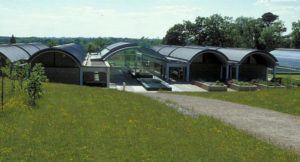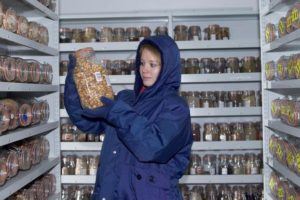Profile
Anne Visscher
Curriculum Vitae
-
Education:
University of Florida (PhD), Wageningen University (MSc), Herman Jordan Lyceum (VWO)
-
Qualifications:
PhD in Horticultural Sciences (August 2009)
-
Work History:
University of Oxford, Department of Plant Sciences
-
Current Job:
Career Development Fellow
-
Employer:
Royal Botanic Gardens, Kew
-
My work
Through my research I try to understand how some plant seeds can survive extreme conditions, such as those found in space
-
Read more
I do research on plant seeds that have been collected from all over the world and that are stored in the Millennium Seed Bank in Sussex. There are more than 300,000 species of plants growing in different parts of planet Earth. I am very interested in plants that can grow in dry and hot places. Scientists have found out that the seeds of some cactus plants can survive being in an oven at 103°C for 17 hours! In my work, I am trying to understand why seeds from some cactus species survive this extreme heat, and others don’t.
Space has many extreme conditions too: not just temperature and drought, but also radiation and low gravity. If humans want to travel to other planets and stay there for a long time, they need to take seeds with them. Without seeds, they cannot grow plants for food, oxygen, clean water and many other things that they will need on another planet. I want to know what the best way is for the seeds to travel from Earth through space. Can some species survive the vacuum of space? Can some species survive the radiation? Or do all seeds need to be protected from outer space?
-
My Typical Day
On a typical day I might do experiments in the lab, look at the results and write them down for a paper
-
Read more
In my job I need to discover things about seeds that have not been understood before. First of all I need to decide what question I would like to answer. For example, in space, an important question is how to store and transport seeds for human spaceflight. Once I have found an important question to answer, I need to make sure that the experiments I am planning have not been done already. I can check that by reading the literature, which may take a while because some research has already been done on seeds in space. For example, seeds have been sent into space on satellites, or on space stations, such as the Russian space station MIR and the International Space Station (ISS).
The next step in the process is to start preparing experiments. At the moment, I am planning to do an experiment with seeds in a vacuum, to prepare for future experiments with seeds on the outside of the International Space Station. Once I am done with an experiment, I often have to analyse the results so that I understand their meaning and I can plan the following experiments. Only when I have enough results to help answer my original question, I can write a report and publish it in a scientific journal. At that stage, my days are often spent in front of the computer, writing and making figures based on my data.
-
What I'd do with the prize money
If I win the prize, I am planning to use it for the ‘Science in the Garden’ outreach programme at the Royal Botanic Gardens, Kew, where I work.
-
My Interview
-
How would you describe yourself in 3 words?
Space biology researcher
What was your favourite subject at school?
Biology
What did you want to be after you left school?
Researcher
Were you ever in trouble at school?
Sometimes
What is the most fun thing you've done?
Travelling around the world
-


